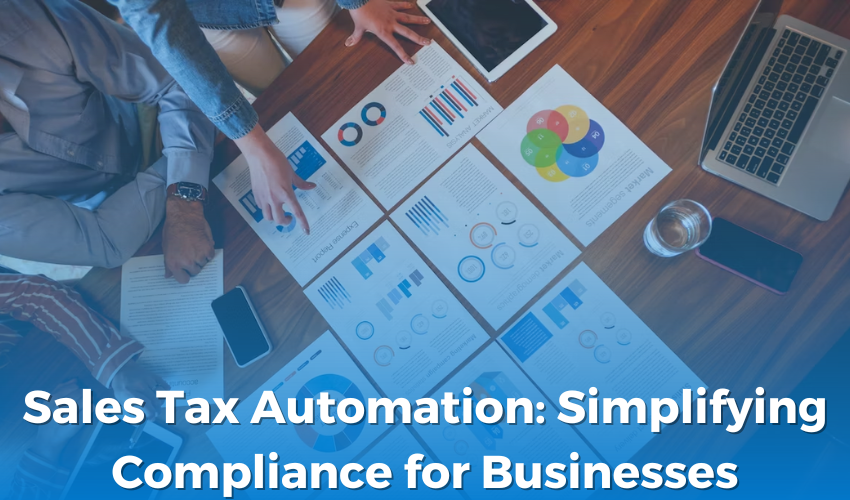

22-12-23
In the dynamic landscape of business operations, staying compliant with sales tax regulations is a constant challenge. The complexities of tax laws, varying rates, and ever-evolving regulations can lead to errors, financial penalties, and strained resources. To navigate this intricate terrain, businesses are increasingly turning to sales tax automation as a powerful solution to simplify compliance processes.
Understanding the Sales Tax Landscape
A sales tax collection is a consumption tax imposed by government authorities on the sale of goods and services. The rates and regulations can vary not only between countries but also within different states and municipalities. For businesses, keeping up with these variations and ensuring accurate calculations can be a daunting task.
The Risks of Manual Compliance
Manual sales tax compliance processes are not only time-consuming but also prone to human errors. With the risk of miscalculations and oversights, businesses may find themselves facing audits, fines, and reputational damage. The burden of staying abreast of ever-changing tax laws adds an additional layer of complexity, particularly for organizations operating in multiple jurisdictions.
Enter Sales Tax Automation
Sales tax automation involves the use of software tools and platforms to streamline and automate the end-to-end sales tax compliance process. This technology-driven approach offers several key benefits to businesses seeking efficiency, accuracy, and peace of mind.
1. Accuracy in Calculations
Automation eliminates the margin for error associated with manual calculations. The sales tax calculation software is programmed to apply the correct rates and rules based on the location of the transaction. This not only reduces the likelihood of mistakes but also ensures that businesses are consistently compliant with the latest tax regulations.
2. Real-Time Updates and Changes
The ever-changing nature of tax laws requires businesses to adapt quickly to regulatory updates. Sales tax automation tools are designed to provide real-time updates, ensuring that businesses are promptly informed about changes in rates, exemptions, and filing requirements. This proactive approach mitigates the risk of non-compliance due to outdated information.
3. Multi-Jurisdictional Compliance
For businesses operating in multiple jurisdictions, managing diverse tax requirements can be overwhelming. Sales tax automation centralizes the compliance process, allowing businesses to navigate the complexities of various tax jurisdictions seamlessly. This ensures uniformity in compliance efforts across different locations.
4. Enhanced Efficiency and Resource Optimization
Automating sales tax registration frees up valuable human resources that can be redirected towards strategic initiatives. With routine and time-consuming tasks automated, finance and accounting teams can focus on more value-added activities, such as financial analysis, planning, and improving overall business performance.
5. Reduced Audit Risks
Accurate and consistent compliance, facilitated by automation, reduces the likelihood of audits. In the event of an audit, automated systems provide a comprehensive and easily accessible trail of transaction data, making the audit process smoother and less disruptive for the business.
Implementing Sales Tax Automation: Key Considerations
While the benefits of sales tax automation are clear, the successful implementation of such systems requires careful consideration.
Scalability: As your operations grow, the automation tool should be able to accommodate increased transaction volumes and additional tax jurisdictions.
Integration: Ensure that the chosen automation tool integrates seamlessly with your existing accounting and enterprise resource planning (ERP) systems.
User-Friendly Interface: Opt for software with an intuitive interface that is user-friendly. This facilitates easier adoption and reduces the learning curve for your team.
Comprehensive Reporting: Look for a solution that provides detailed and customizable reporting capabilities. Comprehensive reporting not only aids in internal analysis but also serves as a valuable resource during audits.
Customer Support: Choose a vendor that offers responsive and reliable customer support. In the event of issues or questions, having access to knowledgeable support staff can be crucial.
Conclusion
Sales tax automation is a strategic investment for businesses looking to simplify compliance processes, mitigate risks, and enhance overall operational efficiency. By leveraging technology to streamline calculations, stay current with regulations, and reduce manual errors, businesses can focus on their core competencies and drive sustainable growth. As the business landscape continues to evolve, embracing sales tax automation is not just a choice but a necessity for those seeking to thrive in an increasingly complex regulatory environment.
Tags : sales tax ,sales tax registration,sales-tax-collection,sales tax calculation













































.jpg)
.jpg)
.jpg)
.jpg)


).jpg)














 Get A Quote
Get A Quote
Leave A Comment